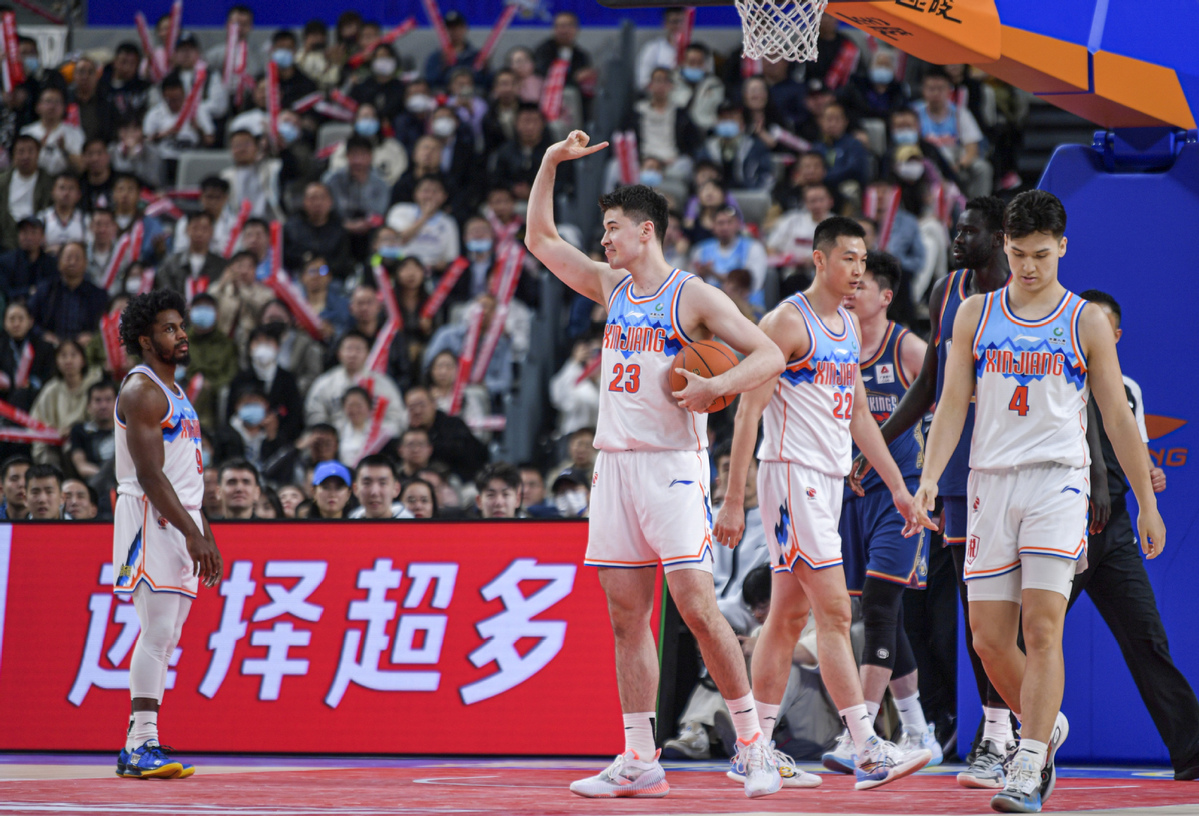CBA sounds buzzer on off-court drama
 0 Comment(s)
0 Comment(s) Print
Print E-mail China Daily, April 13, 2023
E-mail China Daily, April 13, 2023
The Chinese Basketball Association has called for greater respect for rules, more transparency and better communication as it bids to redeem the league's broken image following the disputes involving the Xinjiang Flying Tigers.

As the CBA tips off its 2022-23 playoff action this week, the backlash from the feud still lingers, with CBA officials reflecting on a saga which ended with Xinjiang being reinstated after impetuously quitting the league over a penalty imposed on the club.
Citing loopholes in club management, the CBA league company takes responsibility for the Xinjiang case, but also sees it is an opportunity to improve its operations, according to the company's CEO, Zhang Xiong.
"From our perspective, the league regulations regarding club registration and management need to be further improved, better understood and respected by all parties involved, so that we can avoid such incidents happening again," Zhang said during a CBA media day last week.
The Flying Tigers, the 2016-17 league championship winners, withdrew from the domestic league on Feb 28 in protest against a CBA ruling that banned them from signing any new players for a year.
Xinjiang described the penalty as "unfair and misleading", and denied any wrongdoing in a strongly worded statement. The CBA insisted the Flying Tigers had breached the rules by operating financially in the name of a new company — not the original entity registered with the league.
The dispute took another twist two weeks later when a CBA board meeting voted to allow Xinjiang's return in order to "enhance the cohesion of the entire league organization". That decision, however, was met with criticism and concerns from fans and media, who accused the club of acting recklessly and the league of handling the case unprofessionally.
Despite managing to keep the 20-club competition intact, the league's public image had taken a heavy hit, with seven regular-season games officially scored 0-20 in Xinjiang's absence.
"We are a league still in development after running for just over 20 years," said Zhang. "For sure, there are issues not yet taken care of and there will be new problems regarding the rules and regulations coming up.
"We just need to develop and further optimize our management to handle new challenges better."
From next season, the league company — which is authorized by the CBA to operate, promote and market domestic leagues of different levels — plans to increase its scrutiny of clubs' registration and financial practices and the status of player contracts, according to Zhang.
Xinjiang's punishment was triggered by a league investigation into claims made by its former star player Zhou Qi, whose whistleblowing was merely the latest episode in his long-term contract dispute with the club.
After helping the Flying Tigers win the franchise's solitary CBA title in 2017, Zhou, who was developed in Xinjiang's youth system, joined the NBA's Houston Rockets.
Having completed a two-year stint in the United States, Zhou's attempts to leave Xinjiang for a new CBA club in 2019 were blocked by the Flying Tigers. As per league rules, the club was entitled to retain his services as long as it offered him a maximum contract extension to match any new offers from within the league.
The standoff between Zhou and Xinjiang has left the 2.17-meter center with no official games to play for over four months since he returned from Australia, where he played with the South East Melbourne Phoenix last year.
With Xinjiang punished and reinstated, the league appears intent on retaining a rulebook that favors the clubs' interests over any individual's career choice, while also looking to improve youth development.
"We do worry about his conditioning and form without games to play for so long," CBA president Yao Ming said of Zhou's status last week.
"Rules are rules, though," added Yao, who played with the Rockets from 2002-2011. "We still have a lot of room to improve the rules, and make them fairer and easier for everybody to understand and follow."
With Zhou training on his own, the Chinese men's national team, currently coached by Serbian tactician Aleksandar Djordjevic, faces a tall task at this year's FIBA World Cup, where it will vie with strong Asian rivals — including co-hosts Japan, the Philippines and Lebanon — for the only direct qualification spot to the 2024 Paris Olympics.
A number of surging young guns during the ongoing CBA season have offered some fresh options for Djordjevic, who is keenly observing playoff games across the country to evaluate players with only four months to go before the World Cup tips off.
After leading Guangzhou to knock out Shandong in a best-of-three first-round playoff series on Tuesday, young forward Cui Yongxi has emerged as a potentially useful weapon on the wing for Djordjevic's national squad. Cui averaged a team-high 18.5 points and 10 rebounds in his first two postseason games.
"The CBA league this season has witnessed the rise of a group of young hopefuls and we are excited for their future prospects on the international stage," said Zhang.
"This is what it's all about — setting the stage for young talents to grow and shine. We take pride in their progress and are committed to making the league a better competition."






Go to Forum >>0 Comment(s)